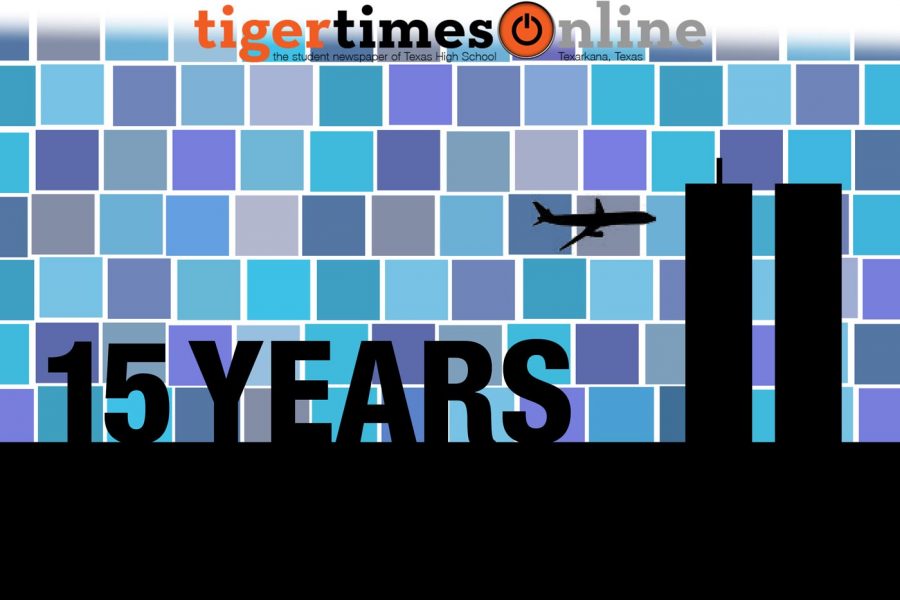A fading memory
September 11, 2016
Photo by Lauren Potter
Idly, he turns on the television. His backpack slung over a chair, he kicks off his shoes, and he keeps his ears perked for the back door opening. He’s in third grade, but already he knows how to stay alert for the sounds of Mom coming home from work. Any minute now, she’ll enter that door, and he’ll have to hurriedly cover all signs of flouting the most important of the house rules–no TV before dinner.
But a great commotion rises from the screen, and he turns toward it curiously, watching with detached interest a giant plane hitting the side of a great steel tower, erupting in a flurry of fire and smoke. Then he watches it happen again, only to another identical tower, while the muffled screams of passersby fill the living room.
It is in this way that he learns what really happened on 9/11.
This year’s freshman class is the first to be made up mostly by students who were born after September of 2001. By the time they were old enough to comprehend tragedy, 9/11 was already a day found mainly in history books, an event that ranked right up along there with Pearl Harbor or Lincoln’s death.
“It’s hard with these kids now, you know,” said Erin Davis, who teaches fourth grade at Morriss Elementary. “They weren’t even born, so that’s the hard thing, that they don’t really see the significance. You can watch it on TV–it’s kinda like the J.F.K. assassination for us–you see it and you know it’s horrific, but you didn’t see it live, so you can’t really relate.”
Understandably, those who missed experiencing it during their lifetimes find it difficult to see it as more than words in a book, or an annual moment of silence that is then forgotten until next September.
“I guess I do feel a connection, because I felt like I knew what happened, but I wasn’t like born yet–it was just something that I knew of,” freshman Georgina Estrada said. “Whenever people talk about their experiences [with 9/11], how they would get emotional was something I felt that I lacked.”
As the 15-year anniversary approaches, younger students try to recall exactly what they know about 9/11.
“[I know] that bad people were sent to destroy us and it was a mass destruction,” said Braylon Holyfield, a fifth grader at Spring Lake Park Elementary. “One day there was a TV show and I watched it and it showed that. No, my parents don’t talk about it in my house. I think they forgot. [But] I think it’s a big deal because a lot of people lost their jobs.
Teachers find it difficult to impart the full meaning behind 9/11 when September rolls around each year, and consequently find that classroom coverage has dwindled.
“In recent years we’ve just talked about having that remembrance,” Davis said. “The kids do it but it’s not real to them. As far as spending a whole day, we don’t spend a whole day on that. We just talk about it a little. Before, the kids would conversate about it, because even though they were little, they had experienced it. Now, they’re going to have a misconstrued idea of it, because they’re looking at, you know, the fire and the flames, not really how it brought America together. Kids aren’t getting the full impact of that.”
Teachers are also faced with lesson plans that don’t explicitly include 9/11 commemoration.
“It’s not a part of our curriculum, it’s just something extra that we do,” said Meredith Gross, fourth-grade teacher at Morriss Elementary. “We discuss what happened and I tell them where I was and how I felt, and try to explain to them so maybe they can understand how they would feel if they had been there.”
And while it could very well be just younger children who are growing up without really understanding that day and its full meaning for Americans, maybe the disconnection began years ago, regardless of if you were alive during it or not.
“As time rolls on, people don’t remember it as much,” science teacher Jessica Sharp said. “It has been 15 years, so it’s not fresh on people’s minds. It’s sad but it’s just the cycle; it’s human nature to forget.”

